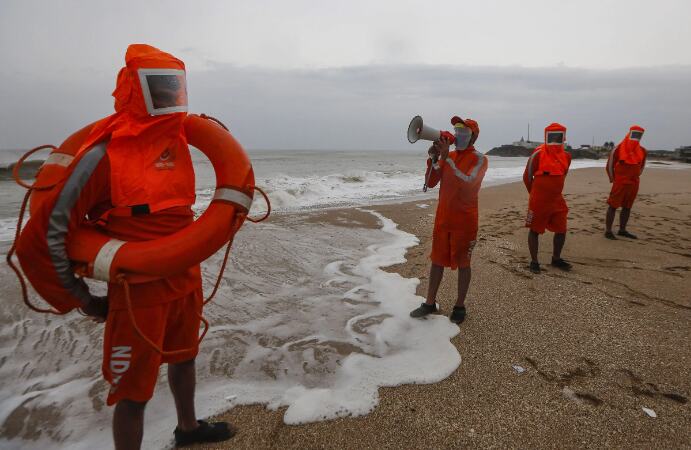Opportunity in crisis
Climate change has brought about calamities of an unprecedented scale which could be abated only with an equally resilient and vibrant societal response

'When the going gets tough, the tough get going' is an expression that reflects the determination of a vibrant society to overcome crisis situations. The pandemic could be largely attributed to humans' manhandling of nature and over-exploitation of resources. The resulting climate change is giving birth to new diseases and inviting natural disasters.
Two severe super cyclonic storms — Tauktae and Yaas — with speeds of more than 185 kmph made landfall within a week. The Tauktae hit the Gujarat coast on May 17 causing massive damage to life and property in western states of Gujarat, Goa, Maharashtra, Karnataka, Kerala and others. Apart from the reported 350 deaths, more than 30,000 houses and 75,000 electric poles were damaged; 70,000 trees uprooted; and numerous animals dead. More than three lakh people were evacuated to safer locations. As many as 350 people out of 700 stranded in ships have been rescued — most of them had not paid heed to the warnings.
The super cyclone Yaas hit the eastern coast on May 26, 2021, causing massive destruction in the West Midnapur, North Pargana, South Pargana and Howrah districts. More than 12 lakh people were evacuated by the West Bengal government. Learning from the Amphan experience, the CM took lead in controlling the damage. Orissa faced similar challenges but it was well-prepared as usual to minimise fatalities. The learnings from the past experiences enabled forces to prevent widespread life loss but the damages to the property could not be minimised.
The National Disaster Management Authority was established in May 2005 to combat natural disasters. Subsequently, Disaster Response Forces were created at the Centre and state level with a build-up infrastructure which is still being upgraded in accordance with the experience gained with each calamity. The country now has a protocol to deal with emergencies with adequate policy backing. The Orissa government was well prepared for the severe Fani Cyclone that struck on May 3, 2019, and thus, it could minimise the damage.
The data on cyclones in the Bay of Bengal reported a 26 per cent increase during the last hundred years. The situation is similar for the west coast and the reason is rising temperatures. Cyclones, wind and storms are witnessed over large water bodies like the sea in low-pressure areas. These are accompanied by heavy rainfall and are formed by the continuous rise of hot air over the oceans. The vacant area is filled with cool air which heats up and rises, ultimately forming the eye of the storms and moving with very high speeds.
Also, the glaciers are melting due to climate change, with rising temperatures causing heavy floods. Further, climatic factors are bringing in more and more cloud bursts especially in the Himalayan region.
The covid-19 crisis is yet another result of ecological disturbance, causing a huge loss of life and drastically affecting the economy. Nature's signals are quite clear — change the way you live, otherwise, be prepared to perish.
The resilience and vibrancy need to be back in society to convert such calamities to opportunities. To cope up with cyclones and intense floods, first of all, disaster-prone areas must have a site-specific long-term integrated plan of action which should also include permanently shifting the population from the most vulnerable points. There should be cyclone site-specific infrastructure and underground electricity wiring in such areas. The housing technology should be such that damages are minimised. Specialized hospitals for people and shelters for the animals must be established. At the village level — like the border areas weapon training programmes of the past — villagers should be trained in mitigation and rescue operations with adequate infrastructure support and technical backup. The district-level development plan should be tuned to environmental needs and big hydroelectric projects near the glaciers and vulnerable slopes. There is a talk about the development of technology to diffuse the dense cloud formation that is responsible for cloud bursts.
Policymakers should revamp the government health infrastructure in the country with sizable fund allocation for creating world-class medical facilities within the reach 60 to 80 kilometres from the villages. The private hospitals should be controlled through a new comprehensive law so that black marketing and selling/manufacturing fake medicines are made strictly punishable. There should be day-to-day monitoring of the production and use of life-saving drugs. Any hospital's license should be cancelled if they are found charging the patients exorbitantly. No license should be granted to hospitals unless they have in-house oxygen plants. The Chief Medical Officers of the Districts must be held responsible for controlling the black marketing and over-charging. The drug controller agency and state police must have a special intelligence branch to oversee this. To bring energetic youth laced with professionalism at the district level, the Indian Medical Service should be created. Health should be considered as a basic right and governments must bring comprehensive health insurance schemes for the citizens to ensure free treatment during the pandemic and beyond.
The writer is the Chairman of Centre for Resource Management and Environment. Views expressed are personal



